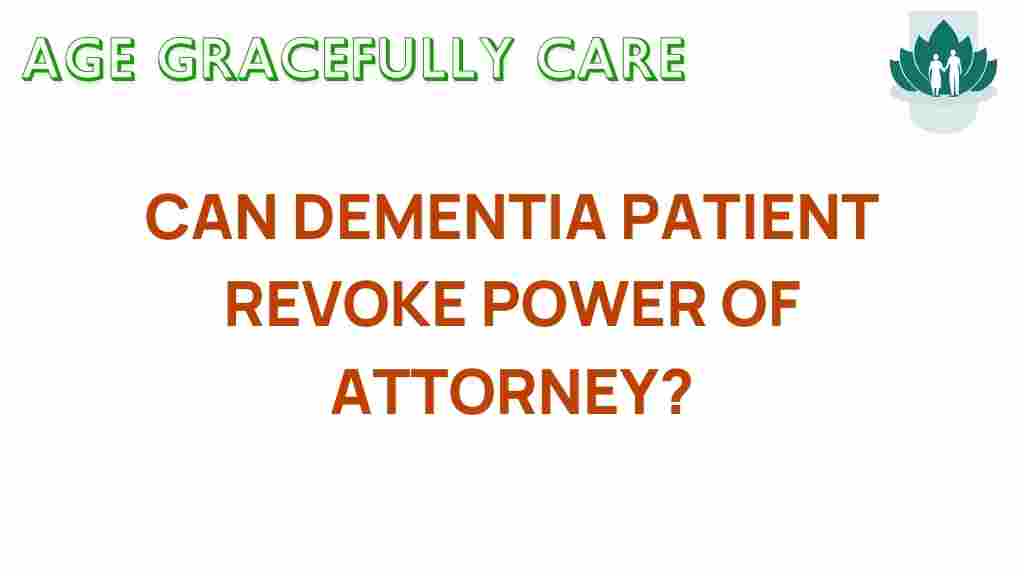Can Dementia Patients Revoke Power of Attorney?
Dementia is a progressive condition that affects cognitive functions, including memory, reasoning, and the ability to make decisions. As dementia progresses, patients may find it increasingly challenging to manage their affairs. This raises an important question: can dementia patients revoke power of attorney? Understanding the legal complexities of this issue is vital for preserving patient autonomy and ensuring that their legal rights are respected.
Understanding Power of Attorney in the Context of Dementia
Power of attorney (POA) is a legal document that grants someone the authority to make decisions on behalf of another person. This can cover various areas, including financial, legal, and healthcare decisions. When a person with dementia designates someone as their agent through a power of attorney, they are entrusting that individual with significant responsibilities. However, as cognitive decline progresses, the ability of the patient to revoke or alter this arrangement becomes a pressing concern.
Legal Rights and Patient Autonomy
Patient autonomy is a cornerstone of elder law, emphasizing the right of individuals to make decisions about their own lives, including healthcare decisions. This principle remains essential even when cognitive decline occurs. The legal capacity to make decisions can fluctuate in dementia patients, and understanding this fluctuation is key to the question of revocation.
Can a Dementia Patient Revoke Power of Attorney?
The ability of a dementia patient to revoke power of attorney depends largely on their legal capacity at the time of the revocation. Here’s a step-by-step breakdown of this complex issue:
Step 1: Assessing Legal Capacity
Legal capacity refers to a person’s ability to understand and appreciate the consequences of their decisions. In the context of dementia, legal capacity can be assessed through:
- Medical Evaluations: A physician specializing in geriatric care can evaluate the patient’s cognitive abilities.
- Legal Assessments: An attorney may conduct an evaluation to determine whether the patient can comprehend the nature of revoking a power of attorney.
Step 2: The Revocation Process
If the patient is deemed to have the legal capacity to revoke the power of attorney, the process typically involves the following steps:
- Written Notice: The patient should provide written notice to the agent and any relevant institutions (e.g., banks, healthcare providers).
- Formal Revocation Document: It may be advisable to create a formal revocation document stating the intent to revoke the power of attorney.
- Notification of Relevant Parties: Inform any third parties who may rely on the power of attorney about the revocation.
Step 3: If the Patient Lacks Legal Capacity
If a dementia patient lacks legal capacity at the time they wish to revoke their power of attorney, the situation becomes more complex. Here are some options:
- Seek Guardianship: Family members or interested parties may petition for guardianship if the agent is acting against the patient’s best interests.
- Legal Intervention: In some cases, legal action may be necessary to contest the power of attorney if the agent is mismanaging the patient’s affairs.
Challenges in Revocation of Power of Attorney
Revoking a power of attorney when dementia is in play can present several challenges:
- Confusion and Misunderstanding: Patients may not fully understand the implications of revocation, leading to confusion about their wishes.
- Agent Resistance: An agent may resist the revocation, especially if they believe they are acting in the patient’s best interests.
- Legal Disputes: Family disagreements may arise regarding the patient’s capacity and the validity of the revocation.
Legal Considerations and Best Practices
When dealing with power of attorney and dementia, it is crucial to consider the following legal aspects:
- State Laws: Laws governing power of attorney and guardianship vary by state. Familiarize yourself with local laws and regulations.
- Consult Legal Professionals: Always seek guidance from an attorney specializing in elder law to navigate the complexities involved.
- Documentation: Keep thorough records of all communications and decisions made regarding the power of attorney.
Troubleshooting Tips for Families
If you find yourself facing challenges related to power of attorney and dementia, consider these troubleshooting tips:
- Communicate Openly: Keep lines of communication open with all family members involved to ensure everyone is on the same page.
- Involve a Mediator: If disputes arise, consider involving a neutral third-party mediator to help facilitate discussions.
- Educate Yourself: Understanding dementia and its impact on decision-making can empower family members to make informed choices.
Conclusion
In conclusion, the question of whether dementia patients can revoke power of attorney is multifaceted and hinges on the legal capacity of the individual at the time of revocation. While those with legal capacity can take steps to revoke a power of attorney, those lacking capacity may require legal intervention or guardianship. It is essential to approach this issue with compassion and a clear understanding of the patient’s legal rights, patient autonomy, and the complexities of elder law.
For more information on legal rights and elder law matters, consult a legal professional experienced in these areas. You can also explore additional resources on dementia and legal rights.
Ultimately, navigating the journey of dementia requires a balance between respecting the wishes of the patient and ensuring their well-being, making it crucial for families to be well-informed and proactive in their approach.
This article is in the category Resources and created by AgeGracefullyCare Team
